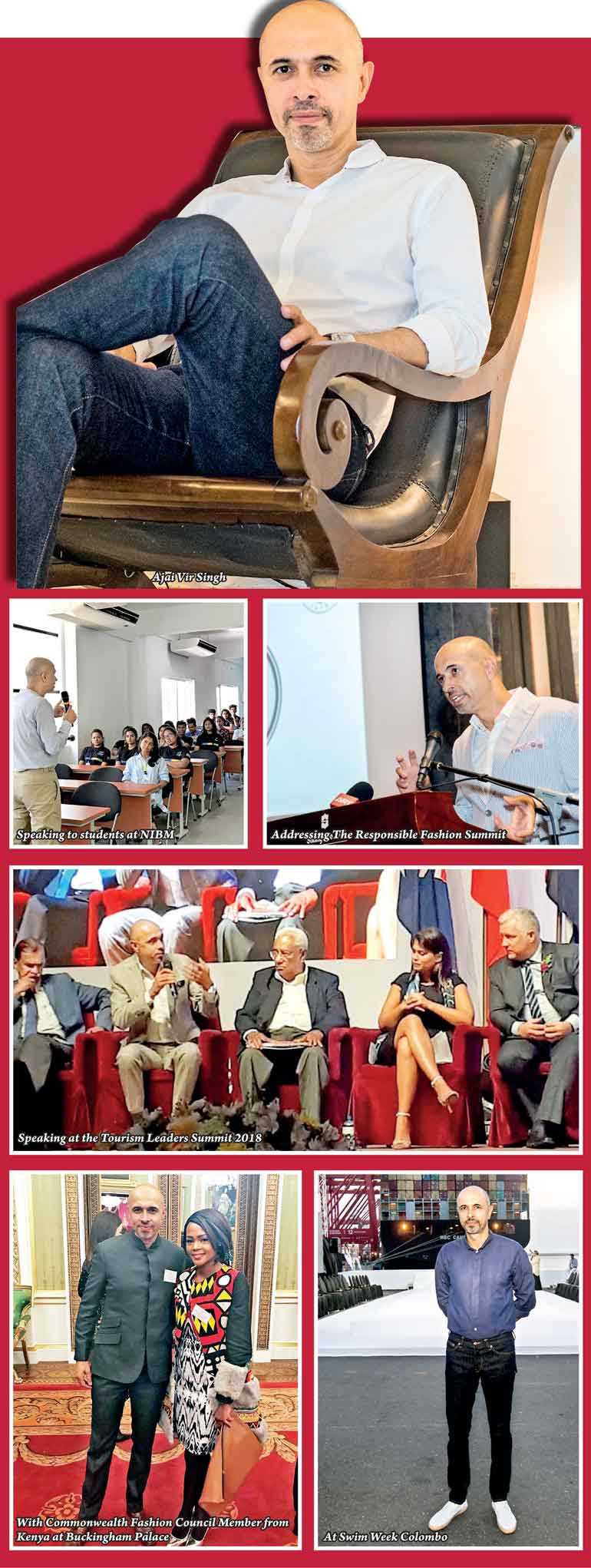Sunday Feb 22, 2026
Sunday Feb 22, 2026
Saturday, 8 December 2018 00:10 - - {{hitsCtrl.values.hits}}

The father of Sri Lanka’s fashion revival, founder of Colombo Fashion Week and champion of responsible and sustainable fashion, Ajai Vir Singh is a man on a mission. Yet another mission, actually – given everything he’s accomplished so far! Fifteen years since CFW hit the ramp, he’s now gearing up for what he terms the ‘next phase of fashion development’ in the country, which he aims to kick off in 2019. It’s not CFW success alone that marks him out – this is also the man who coined the game-changing phrase ‘Garments Without Guilt’ and headed the global marketing campaign for Sri Lanka Apparel that won Asia’s first Global Effie. Given his spectacular achievements in an industry into which he breathed new life, Ajai is no less than the Godfather of Sri Lankan Fashion. Here, he takes some time off to chart his journey in the fashion industry:
Q: You’re credited with fathering the Sri Lankan fashion revival and giving the industry its voice. What drove you to do this and are you satisfied with the industry’s progress?
Sri Lanka has a vibrant environment for any creative industry to flourish. Close to 20 years ago, I realised, while architecture, photography, art and others were growing, fashion as an industry was stagnant. And there were various reasons – starting from surplus stock lots dominating the retail market, hardly any fashion schools, very few fashion designers, there was little or no interest in the next generation to pursue fashion design as their profession, which I thought was sad.
I didn’t know where to start, one of my initial thoughts was to attempt a progressive platform that could encourage and impact different aspects of the fashion industry. This was the idea that gave birth to Colombo Fashion Week in 2003.
If you look back and from there to 15 years later, which is now, by god’s grace every year for the last 15 years, the industry has moved forward, there has been a steady progress; we know there is future for the fashion designers. The Colombo Fashion Week became the backbone of the fashion industry that mentored, groomed, marketed and showcased designers; it created an eco-system for fashion to flourish. This impacted fashion education, there was a newfound desire among the young ones to take fashion as a profession. With the introduction of multi brand and single brand retail stores, fashion consumers became aware of Sri Lankan fashion talent. There has been good progress compared to where we started. But it’s still a journey and we need to keep progressing.
Q: You recently announced the ‘next phase of fashion development’ in the country. Could you give us a breakdown of what to expect?
The first 15 years to me was the first phase, and the next 15 will be the second phase of development, which will be announced in detail soon. It has really interesting aspects aimed at impacting certain sectors within the industry to bring about desired results for the designers and the market. I had been working on it for the last couple of years. Designer development, retail program and fairs will be one of the key focus areas, while others get a step up as well.
Q: How does Colombo Fashion Week work to impact Sri Lanka’s fashion design industry?
Since its start, CFW has been designed as a hybrid platform to directly impact the industry. It showcased the industry and integrated itself as a platform that worked with designers worked around their empowerment.
When I started it, I couldn’t model it on any other fashion week, as our market conditions were so different, the fashion week had to be tailor-made to suit our environment and our nascent industry. So if you carefully look at all fashion week formats in Asia or South Asia, our format is different; yet in the last few years, a few other fashion weeks in South East Asia have adopted our format of showcasing.
Q: In 2008 you launched Arugam Bay Beachwear, with an intention of creating an international fashion brand based out of Sri Lanka, and although you sold it later, it paved the way for more Sri Lankan fashion brands. Looking back, what are your thoughts?
Arugam Bay was very close to my heart, it gave shape to a desire that I had of creating a Sri Lankan brand with an international outlook. My thoughts were that as an island nation, we should have had beachwear or swimwear brands and there were none at that time. I was happy it inspired and led the way in creating other Sri Lankan brands with international outlook. We need more and I am hopeful we will see more.
Q: In recognition of your efforts in impacting the fashion industry, you were appointed as a Founding Member of the Commonwealth Fashion Council based in London. How has that appointment helped you and how has it helped boost the local fashion industry?
This was a very interesting appointment, and obviously I was surprised when it happened. But this opened the way for creating more opportunities for Sri Lankan designers. Along with the CW council we have identified six countries which are important fashion markets for the Sri Lankan designers. There more work being done to create opportunities there.
Vathsala Gunasekara got the first opportunity to show her creation in London. I am sure more will follow in 2019. There are other interactive programs planned with the CW council.
Q: In 2017, you founded The Responsible Fashion Movement, which is gaining momentum as the most relevant platform to address and build awareness about the issues facing the global fashion industry and its supply chain. How is that going and what are the key challenges?
The Responsible Fashion Movement is designed and envisioned to have Sri Lanka lead the effort of impacting the fashion supply chain from Asia to the world. This movement is cutting edge in its effort as it is very relevant to the current issues faced by the global industry. This movement has key stakeholders and partners from the apparel industry like MAS, Hirdaramani, Brandix and Beira Group who came forward to make this a reality.
In 2019, the Responsible Fashion Movement will host the third summit in June. There is a gap in Asia on this front and Sri Lanka is perfectly placed to take the lead with real stories. This will not only build awareness but present solutions which are open source files for anyone to follow to impact their environments. This has generated a lot of interest in Asia and Europe.
Q: In July this year you launched Pigeon Island, a resortwear/beachwear brand with marine conservation and fabrics made from plastic as the key brand story, with the primary purpose to make people conscious of their action and impact the environment positively. How did this come about and how successful is it?
Well you can say it’s the same stream that gave birth to the Responsible Fashion Movement and before that the ‘Garments without Guilt’. Plastics and its effect on the marine environment is not a hidden fact anymore, it’s a real challenge.
I am a diver and Pigeon Island is one of my favourite spots. I saw the vulnerability of that island and used to think that if I ever start another beachwear brand it should bring awareness about the marine life and its importance around Pigeon Island and then take that format beyond it.
Currently through the brand Pigeon Island we aim to positively impact Olive Ridley and Hawksbill turtles and the Grey Reef and Black Tip sharks along with coral conservation. The brand is quite new and we developing the format further. Our shorts are created by directly recycling PET bottles.
Q: In 2006 you coined the phrase ‘Garments Without Guilt’ when you were developing the global brand communication project for Sri Lanka Apparel, through the company you were heading. In 2009, the global marketing campaign that you headed for Sri Lanka Apparel won you a Global Effie in New York, the first Asian entry to win a Global Effie. Could you tell us about the projects and their success?
This was such a delightful surprise. When I wrote the phrase ‘Garments Without Guilt,’ I never thought it would make such an impact. Yes, it was strong, but the way it gave direction and drove the industry’s marketing effort was just phenomenal. It was one of the first global efforts to position the apparel industry.
I enjoyed the Global Effie win. I didn’t know we were the first Asian entry to win the Global Effie till we got to New York, so it made the win even sweeter when we realised we won it for a local brand on an international level. This campaign proved it had a direct impact on business growth for Sri Lanka Apparel.